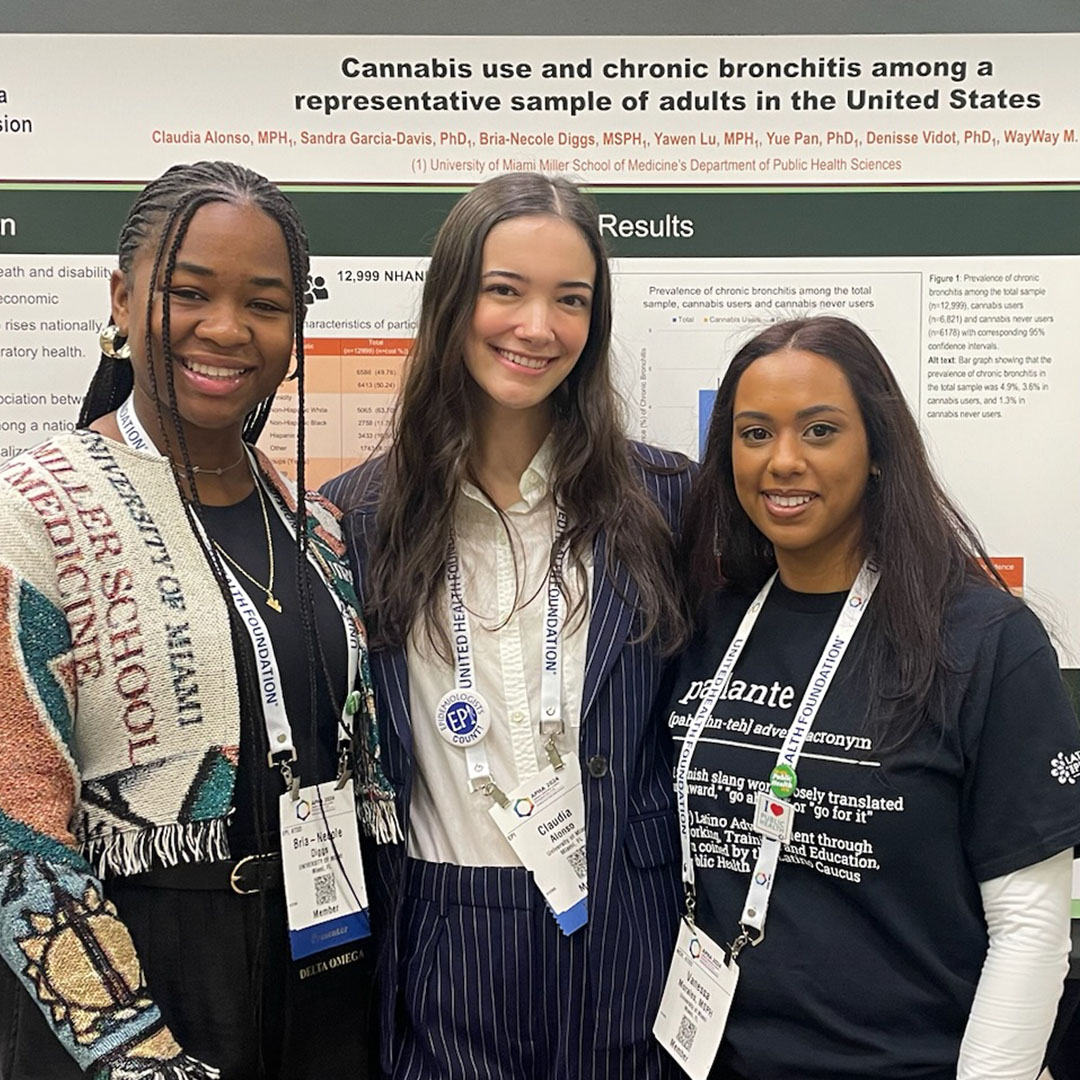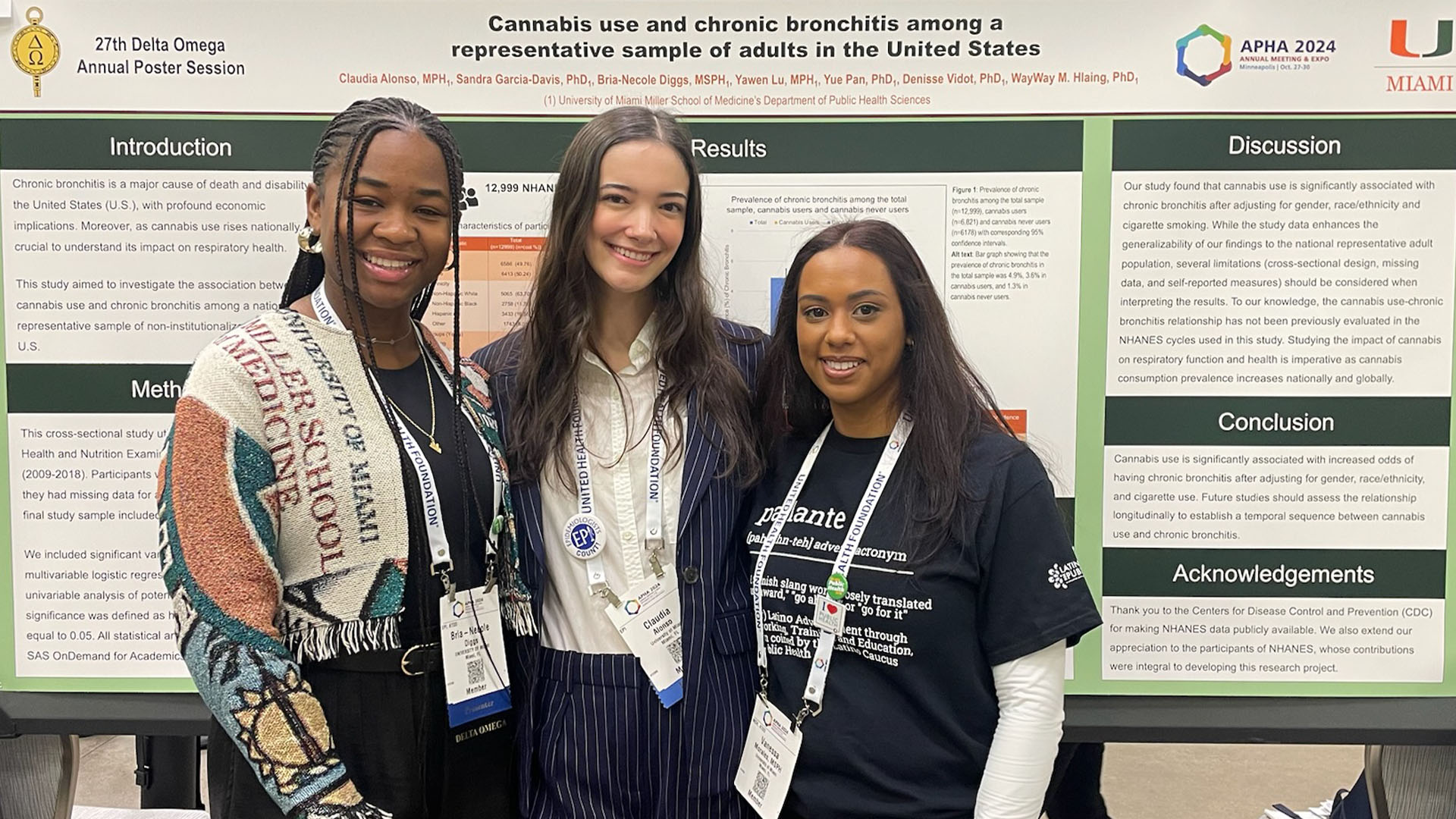Investigating Cannabis Use and Chronic Bronchitis
Claudia Alonso, M.P.H., a second-year Ph.D. student in Epidemiology, displayed her poster titled “Cannabis Use and Chronic Bronchitis Among U.S. Adults” at the highly competitive Delta Omega Student Poster Session, where she was selected as one of only 29 students nationwide to present.
Using data from 12,999 participants across five NHANES cycles, Alonso’s study revealed a significant association between cannabis use and chronic bronchitis. After adjusting for variables such as gender, race/ethnicity, and cigarette use, cannabis users were found to have increased odds of having chronic bronchitis.
"As cannabis consumption rises nationally and globally, understanding its impact on respiratory health will be critical," Alonso explained.
Reflecting on the experience, Alonso said, "Being selected by the Delta Omega Organization to present was an honor and a unique opportunity to connect with outstanding public health students from across the nation." Her recognition at the APHA awards ceremony marked her as an emerging leader in public health research.
Environmental Impacts on Health and Fertility
Alumna Venkata Madhavi, M.P.H. ’24, MBBS, presented her research titled “Heat Stress Exposure and In Vitro Fertilization (IVF) Outcomes” in collaboration with Naresh Kumar, Ph.D., professor at the Department of Public Health Sciences. The study investigated the effects of heat stress—a growing concern due to climate change—on IVF outcomes, addressing the intersection of environmental health and reproductive care.
The multicentric retrospective cross-sectional study examined time-lagged effects of heat stress on critical IVF factors, including:
- Quality and quantity of oocytes and embryos.
- Pregnancy confirmation rates.
- Incidence of spontaneous abortion.
Dr. Madhavi highlighted potential challenges in fertility treatments caused by environmental stressors and emphasized the need for targeted interventions to improve outcomes and reduce healthcare costs.
“Climate change isn’t just an environmental issue—it’s a public health issue that impacts even the most sensitive aspects of human health, such as fertility,” Dr. Madhavi explained. Her work demonstrates the critical need to integrate environmental health considerations into reproductive care.
Exploring HIV Prevention Preferences Among Latino Sexual Minority Men
Nequiel Reyes, a third-year Ph.D. student in the Prevention Science and Community Health program, presented her research titled “Latino Sexual Minority Men’s PrEP Modality Preferences: A Latent Class Analysis.” This marked Reyes’ first in-person attendance at APHA, where she shared findings from her secondary analysis examining the PrEP modality preferences of 214 Latino sexual minority men (LSMM) in South Florida who were not currently using PrEP.
Reyes’ research aligns with the goals of the Ending the HIV Epidemic (EHE) initiative, which seeks to expand PrEP engagement among populations disproportionately affected by HIV. Using latent class analysis (LCA), Reyes identified three distinct preference groups among LSMM:
- Reluctant Users (30.5%): Minimal interest in most PrEP modalities.
- Willing with Constraints (36.0%): Interest in daily oral, on-demand, and quarterly injectable PrEP, with specific limitations.
- Enthusiastic Users (33.5%): High interest in all modalities except rectal douching.
Key predictors of PrEP modality preferences included altruism, community normalization of PrEP, and migration history. Reyes emphasized, "Understanding the diverse preferences of Latino sexual minority men is crucial to advancing HIV prevention efforts and addressing health inequities in underserved communities."
The findings, currently under review for publication, highlight the importance of personalized outreach efforts to resonate with the preferences and experiences of LSMM.
Healthcare Access and Cognitive Health Challenges Among Limited English Proficiency Adolescents
Ph.D. student Saurabh Kalra presented “Exploring Healthcare Access and Cognitive Health Challenges Among Limited English Proficiency Adolescents: Insights from a Nationwide Study.” This research investigated the healthcare barriers faced by adolescents with Limited English Proficiency (LEP) using data from the CDC’s Youth Risk Behavior Survey, which included over 23,000 high school students.
The study found that LEP adolescents were significantly less likely to access oral healthcare, with nearly 60% reporting no dental visits in the past year compared to 22% of English-speaking peers. Additionally, 43.4% of LEP adolescents reported serious cognitive health challenges—substantially higher than the 32% reported by English-speaking adolescents.
Kalra emphasized the compounded disparities in oral and cognitive health: LEP adolescents were 64% less likely to visit a dentist and 64% more likely to experience cognitive health difficulties.
"These findings highlight the urgent need for culturally competent care, interpreter services, and plain language communication to improve healthcare access and outcomes for this vulnerable population," Kalra explained.
Advancing Medical Education Through Interpreter Training
In the Health Equity Committee, Erin Albertini, M.D./M.P.H. candidate, presented “Hold the Phone: The Efficacy of Interpreter Use Training to Improve Medical Student Understanding and Confidence Prior to Clinical Rotations.” Her study evaluated a novel training program designed to equip medical students with the skills to effectively use medical interpreters, improving care for patients with non-English language preferences.
The study included 200 medical students, with surveys showing significant improvements in understanding, confidence, and perceived importance of interpreter use following the training. "Effective interpreter training not only improves communication but also fosters empathy and trust, which are essential for positive health outcomes," Albertini noted.
Mental Health Challenges Among Asylees
Albertini also delivered an oral presentation in the Latino Caucus titled “Pushed to a Breaking Point: The Impact of Push Factors on the Mental Health of Asylees.” Her research investigated how traumatic push factors—such as organized violence, domestic violence, and persecution—affect the severity of depression and PTSD in asylees.
Analyzing data from 162 medical affidavits, the study identified organized violence (48.1%), domestic violence (42.0%), and persecution (27.2%) as the most frequently experienced push factors. Multivariate analysis revealed significant interactions among these factors, predicting worse mental health outcomes.
"By understanding the mental health impacts of push factors, we can develop targeted resources and strengthen support for asylees navigating the effects of trauma," Albertini explained.
A Collaborative Mentoring Model Driving Success
Demonstrating a forward-thinking approach to education, an innovative group-mentoring model was introduced for first-year Ph.D. students in Epidemiology. This year-long mentorship, which replaced traditional research rotations, was led by WayWay Hlaing, M.S., Ph.D., professor and director of the Ph.D. Epidemiology Program, in collaboration with Yue Pan, Ph.D., assistant professor of Biostatistics, and Denise Vidot, Ph.D., associate professor at the School of Nursing and Health Studies, with affiliations at Sylvester Comprehensive Cancer Center and the Department of Public Health Sciences.
The group, which included senior Ph.D. peer mentor Dr. Sandra Garcia and three first-year students—Claudia Alonso, Bria Diggs, and Yawen Lu—focused on a shared research interest in health disparities using the National Health and Nutrition Examination Survey data, a program conducted by the National Center for Health Statistics, part of the Centers for Disease Control and Prevention. Through regular group meetings and individual mentoring sessions, the students developed independent projects that culminated in posters displayed at APHA.
"This collaborative approach provides a strong foundation for students, combining mentorship, teamwork, and hands-on research experience," said Dr. Hlaing.
The students are now preparing to submit their projects to peer-reviewed journals, reflecting the program’s success in fostering promising careers in epidemiology.
Written by Deycha Torres Hernández, published on November 25, 2024.






